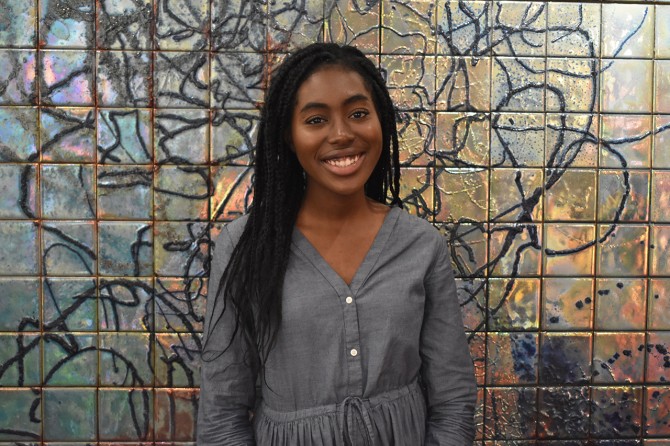ILR’s High Road fellows make an impact on Western New York
By Joan Roberts
The High Road fellowship program is sending 21 undergraduates to work with Western New York community-based organizations this summer. The ILR School program, based in Buffalo, has been pairing students with nonprofits for 10 years. Students learn as much as they can about a community concern, conduct research and share new approaches to civic challenges.
ILR is an influencer in the region, according to Buffalo Mayor Byron Brown, which has had “a significant impact in educating people, preparing people for work in labor relations and in helping to prepare people to negotiate agreements in the community,” he said. “It’s been in this community for a very long time and has had a profound impact on Buffalo and the Western New York community.”
High Road fellowships, part of ILR’s land-grant mission to serve New York state, present students with a living co-laboratory where they contribute to real-life community-driven solutions. So far, 171 High Road students have worked on grassroots economic development projects with more than 40 community organizations affiliated with the Partnership for the Public Good.
The organization, created in 2007 by a diverse network including ILR, was incubated by Cornell. It is a community think tank that provides research, policy development and advocacy to more than 280 organizations in the Buffalo-Niagara region. Working with Cornell and other partners, it seeks to create local and state policies to advance equality, sustainability and cultural vibrancy.
Each summer, High Road fellowships bring students to Buffalo to work with organizations on issues such as urban revitalization, the green economy, job creation, small-business development, civic engagement, labor-community alliances, poverty alleviation and economic policy.
In summer 2016, High Road fellow Jenna Boland ’18 worked with the Western New York Law Center, a nonprofit legal services organization representing people with low incomes. The nonprofit represents homeowners facing foreclosure and advocates for banking reform, community reinvestment, and access to fair and affordable housing. Boland researched and wrote a report with policy recommendations on the implications of foreclosure and advised the city of Buffalo on how it could track vacant properties.
In summer 2017, Maame Britwum ’20 continued the work by conducting applied research to support the creation of a vacant properties registry, tracked recent fires to document a link between vacant properties to the greater risk of arson resulting in neighborhood blight.
Building on the work of her student predecessor, Britwum created a data-supported report on the relationship between vacant and/or abandoned property and residential fires in Buffalo. She cited recommendations for community involvement to address the issue, highlighted best practices of local organizations engaged in community development and met with legislators in Albany.
Kate Lockhart, paralegal and data manager at the Western Law Center, said the issue of vacant and abandoned zombie foreclosures has plagued Western New York for years. “While the problem is widely known, the scope and scale of the problem has been hard to determine,” she said. “Advocacy is always strengthened by good data and the research and writing done by our High Road fellows has been spectacular. With this research, we’ve been successful in passing statewide legislation to combat the rising problem of abandoned residential properties by creating new obligations for mortgage owners and lenders to maintain vacant and abandoned property.”
Said Lou Jean Fleron, emerita extension faculty member and co-founder of the High Road fellowship program: “This June, we are happy to celebrate 10 years of High Road contributions to the Western New York economy and to launch Careers in Public Service, a new student initiative designed to create career pathways for the next generation of government leaders.”
With funding from the New York State Assembly and Senate, Careers in Public Service will provide internships with public officials and government agencies, sponsor policy forums, and provide networking activities to generate interest in democracy and public service.
Through these programs, Cornell students work on the edge of the new economy, gain hands-on experience in the equitable revitalization of an American city and learn real-world lessons in finding the common good, Fleron said.
Joan Roberts is a member of the ILR School’s Communications and Marketing Department.
Media Contact
Get Cornell news delivered right to your inbox.
Subscribe

